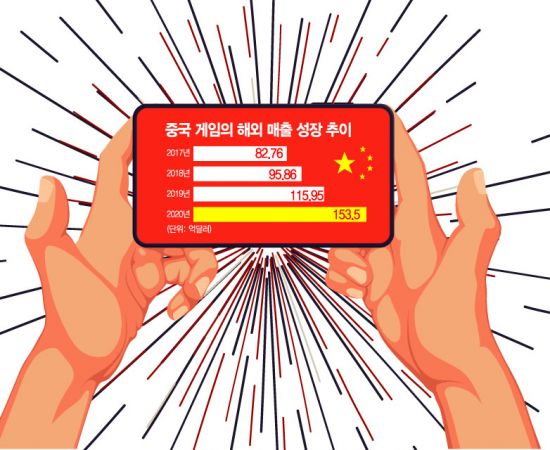Reverse discrimination created by regulation
Issued in 3 years and 9 months after THAAD
China, sales of 1.2 trillion won in Korea last year
Sensational advertising, sanctions even in controversy

[아시아경제 강나훔 기자]1473 days. This is the time it took for domestic games to receive Chinese foreign capital after the THAAD (high-altitude missile defense system) incident in March 2017. For about 3 years and 9 months, the export route of domestic games to China was blocked, and in the meantime, Chinese-made games entered the domestic market without any restrictions and increased their market share by making big profits. The voice of the industry is also rising, hoping for the government to actively regulate Chinese games.
According to the’Global Game Industry Trend’ published earlier this month by the Korea Creative Content Agency on the 16th, overseas sales of Chinese games last year reached $15.4 billion (about 17 trillion won), an increase of 33% from the previous year.
It is estimated that the scale of the Korean game industry last year exceeded 17 trillion won. In other words, China is raising sales in overseas markets corresponding to the size of the Korean market. In particular, mobile games in China last year generated sales of about 1.26 trillion won in Korea. Korea’s share of overseas sales of Chinese mobile games is 8.8%, the third largest after the US and Japan.
On the contrary, it is difficult for domestic game companies to even enter the Chinese market. When the Korean government deployed THAAD in 2017, the Chinese government maintained the stance of the Korean-Korean government as a backlash. Because of this, Korean games have failed to advance into China. Until last December’s’Summoners War: Arena of the Sky’ of Com2uS received the Chinese version, there has been no issue of a single issue for domestic games since March 2017. The issue of reverse discrimination by the authorities between Chinese game companies and domestic game companies is inevitable.
In order for overseas game companies to service mobile games in Korea, they actually only need approval from the platform company. Most of them are overseas corporations, so it is difficult to punish them under domestic law without committing some illegality. In particular, Chinese games have received a lot of criticism for their ‘predatory’ behavior, such as encouraging billing as well as sensational advertisements and unilaterally ending the service less than a year after the service started.
The Chinese game’Queen’s Taste (The Emperor’s Dream)’ is a representative example of the sensational controversy. By employing a Japanese AV actor as a model, they promoted’Feel the taste of Mikami infants’, while the female character’s blatantly exposed specific parts of the body received many criticisms. The Game Product Management Committee issued a recommendation to each platform business operator to block advertisements, but there was no further action.
Regarding’Moktu’, there is’Shining Nicky’, a Chinese fashion game that suddenly terminated its service due to the recent issue of’Northeast Hanbok’. The game, released by Chinese game company Paper Games, started service in Korea on November 29 last year. However, when controversy arose around the Korean-Chinese Internet community over claims of Chinese users that Hanbok originated from the Ming Dynasty’s’Hanpu’, Paper Games announced that it would terminate the service in just a week.
“It is necessary for the government to recognize that the ban on entry to Korean games in China is a violation of the World Trade Organization (WTO) agreement, and that it is a significant obstacle to Korea-China economic and cultural cooperation.” “In addition, based on the principle of reciprocity, it is necessary to strengthen the deliberation of Chinese games by the Game Management Committee.”
In this regard, an official from the Game Management Committee said, “Because we view all overseas game companies that have entered Korea with the same standards, we cannot impose other standards for games in a specific country. It is a stage, and China is managed by the state, so the viewpoint of viewing (reverse discrimination controversy) may be different,” he said.
Reporter Kang Nahum [email protected]
